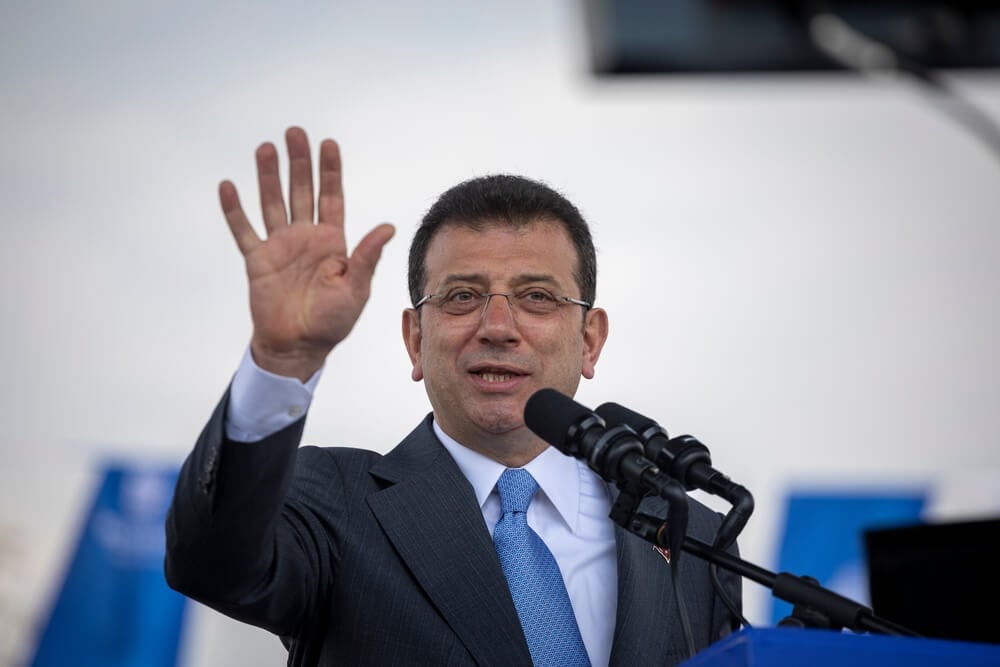Turkish President Recep Tayyip Erdoğan must be gambling that his allies will not turn their backs on him as he cracks down on the largest demonstrations in more than a decade with mass arrests as he slides further towards autocracy.
Turkey has become a more critical player for the EU as it seeks to boost its defence in the wake of US disengagement from the world, leaving European countries scrambling to forge a new role as defenders of democracy while also bolstering NATO.
But will Europe be able to court Turkey as a key defence partner while upholding its democratic values?
For seven nights, protesters chanting “hak, hukuk, adalet”, meaning “rights, law, justice”, took to the streets of Istanbul and Ankara, culminating 25 March. The main opposition Republican People's Party (CHP) called for a mass rally this Saturday when Ramadan may end.
The protests were sparked by the arrest of Ekrem İmamoğlu, the mayor of Istanbul who is the CHP’s candidate for the next presidential election due by 2028. He was viewed as the only challenger able to defeat Erdoğan’s Justice and Development Party (AKP).
Turkish authorities laid the groundwork for his arrest by revoking his university diploma the day before and thus making him ineligible to run for president under Turkish law.
İmamoğlu strongly rejects the corruption charges against him, saying his detention has “not only harmed Turkey’s international reputation but has also shattered the public’s sense of justice and trust in the economy.”
Western reaction
More than 1,400 protestors, including lawyers, journalists and students, have been arrested. Turkey also issued court orders to close more than 700 accounts on X, targeting “news organisations, journalists, political figures, students and others within Turkiye”, the online platform said on Sunday.
Erdoğan himself used X and said: “The days of taking to the streets along with leftwing organisations and vandals to point the finger at the national will are over… We will definitely not allow the CHP and its supporters to disrupt public order and disturb the peace of our nation through provocations.”
Western reaction has been muted so far. With US President Donald Trump courting Russian President Vladimir Putin, few expect him to worry about democracy within Turkey.
Fox News reported on 21 March that Trump was thinking about unblocking the sale of F-35 fighter jets to Turkey while Erdoğan is due to visit Washington next month.
Turkish companies would like to benefit from the EU’s €150 billion ReArm Europe defence spending bonanza
But the EU is in a stickier position given its stated treaty goal to uphold values including freedom, the rule of law and human rights, but it has some bargaining chips.
Turkish companies would like to benefit from the EU’s €150 billion ReArm Europe defence spending bonanza. Turkey has the second-largest army in NATO and is also an aspiring EU membership candidate.
Giving Europe further room to manoeuvre is the strengthening of borders in neighbouring countries, including Greece, meaning Turkey cannot easily threaten an influx of migrants into the EU as it did in 2020, when it deemed insufficient an EU offer of aid to deal with Syrian refugees.
Turkey’s strategic position
German Chancellor Olaf Scholz called İmamoğlu’s arrest a “very, very bad sign” for Turkey’s relations with the EU. Greece, meanwhile, announced the postponement of an April meeting between Erdoğan and Kyriakos Mitsotakis, Greek prime minister, under the framework of the Greece-Turkey High-Level Council for Cooperation, which aims to improve relations between the countries.
But a European Commission spokesman refused to “speculate on possible cancellations” of high-level dialogues between the EU and Turkey scheduled in April.
Europe knows that Turkey’s strategic position has strengthened recently
Europe knows that Turkey’s strategic position has strengthened recently. Turkish soldiers would be sorely needed as peacekeepers in Ukraine if such a force ever came to fruition. Turkey is also a key player in post-Assad Syria now that the former rebel group it supported leads the new government.
The US also needs Turkey’s cooperation in countering Iran’s influence in the Middle East, Bilal Bilici, a CHP member of the Turkish parliament, wrote recently.
“EU governments, already struggling to reconfigure their security strategies in the wake of the war in Ukraine, might not be able to afford provoking Turkey,” he said. “And while they may issue statements of concern, they’ll likely hesitate to impose real consequences, giving the AKP further confidence it can act without meaningful repercussions.”
Peace process with the Kurds
This could mean that Erdoğan is unimpeded in his repression, which has been unfolding for several months. Last October, for example, three Istanbul district mayors were removed and accused of corruption and terrorism, and one was replaced with a government appointee.
 The demonstrators may find it difficult to sustain widespread support - Ekrem İmamoğlu
The demonstrators may find it difficult to sustain widespread support - Ekrem İmamoğlu
Turkey is still exploring the possibility of a peace process with the Kurds after Abdullah Ocalan, leader of the Kurdistan Workers’ Party, last month declared a ceasefire in its decades-long insurgency.
İmamoğlu’s arrest strengthens Erdoğan’s hand in breaking an alliance between the CHP and the main Kurdish party, the Peoples’ Equality and Democracy Party (DEM). Erdoğan could hold the Kurdish peace process to ransom to ensure DEM keeps quiet about the treatment of its CHP allies.
The crackdown has proved financially costly for Turkey, which sold about $25 billion of foreign currency reserves to support the lira after market turmoil provoked by the unrest. But the government has sought to reassure investors, and the lira recovered this week.
However, the demonstrators have vowed to continue their street protests, and they want Turks to boycott companies that back Erdoğan. They may find it difficult to sustain widespread support given that pro-government television channels are ignoring the protests and only opposition-run media are providing coverage. Europe will be watching closely.